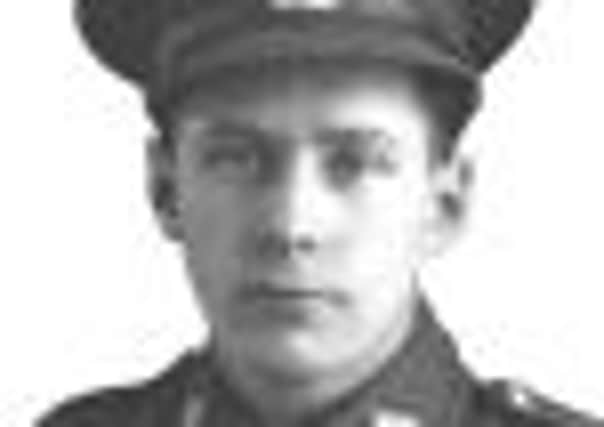Obituary: Tom Macartney - Veteran of some of Second World War’s fiercest action and an engineer of global reach


TOM Macartney was a world-class engineer whose skills were forged in the Clyde shipyards, but it was his harrowing experiences in the Second World War that shaped his life.
Macartney, who has died aged 90, fought in three of the bloodiest battles of the war, firing field guns at El Alamein until the barrels glowed red-hot, and surviving the carnage at Monte Cassino before again going into action at Anzio.
Advertisement
Hide AdAdvertisement
Hide AdHe was attached to the 51st Lowland Division as a 22-year-old Royal Artillery gunner when he fought with General Montgomery’s Eighth Army. For two-and-a-half years he fired a 25-pounder gun in North Africa until the Desert Rats finally routed Erwin Rommel’s Afrika Korps.
After fighting his way across Sicily he crossed the Strait of Messina and onto the Italian peninsula and went into action at Cassino, but he was pulled out of the line to join the landings at Anzio in January 1944, as part of the Allied push towards Rome. However, the advance stalled, the Germans consolidated their defences, and the entire area became a killing ground.
Both the Allied and Axis sides fought desperately and often brutally, with German veterans of the Eastern Front describing the battle as “worse than Stalingrad”. Constantly under enemy observation and within artillery range, the Allies were subjected to ground and air attack day and night. Macartney took part in bloody hand-to-hand fighting as hard-fought positions were wrestled from one side to the other.
By May a huge toll of casualties had mounted on both sides, but the Allies finally broke through and advanced on the Italian capital. The war raged on for another year but when it ended, Macartney, despite having been involved in some of the heaviest fighting, had managed to survive without being wounded.
He made an emotional return to Anzio in 2003, when he paid his respects after tracing the grave of a close friend and comrade, Bill Senior, who had been the first to welcome him to the Sergeants’ mess on his promotion. Senior was killed beside Macartney when the adjacent gun pit took a direct hit.
Thomas Wilson Macartney was born in Ruchill, Glasgow in 1920, the son of a dairyman, and was educated at Kelvinside Academy. The family business stretched across the west of Scotland and had been largely successful but was hit by the Great Depression and, although the family avoided poverty, times were hard for many years.
Macartney left the army after the war in the rank of Sergeant-Major and resumed his civilian career with Hugh Smith (Glasgow) Ltd, where he had started as an apprentice at 15. Smiths made massive machine tools for the hulls of ships, pipelines, pressure vessels and many other applications.
In a career spanning 50 years, he qualified as a fitter before becoming a draughtsman and section leader, while attending Glasgow’s Royal Technical College, now Strathclyde University. His skills and qualifications led to the position of contract engineer and, finally, contract manager.
Advertisement
Hide AdAdvertisement
Hide AdMacartney personally designed several machines and was instrumental in the development of the vertical plate bender that is used today in shipyards all over the world. He visited more than 40 countries in the course of his work and frequently drummed up new business while entertaining foreign clients at The Buttery in Glasgow.
His main passions were engineering and the intellectual problems it generated. He despaired at the decline of shipbuilding on the Clyde and in the UK generally.
Fairfields, Alexander Stephens, John Browns, Scott Lithgow, Connells, Harland and Wolff, Swan Hunter and dozens of yards long gone were names well known to him, as he worked in all of them. After Hugh Smiths went into receivership, he and a colleague, Eddie Rutherford, formed and ran a successful consultancy for almost 25 years, with Macartney working on until he was 82.
The shipbuilding move to Asia saddened Macartney, for whom the label “Clyde-built” meant everything. A proud Scottish Nationalist, he also opposed UK economic policy biased towards London and the south-east of England – which was one of the main reasons he often insisted: “Scotland should make decisions in Scotland for Scotland.”
He was a member of the SNP for almost 40 years and was proud of the way Alex Salmond and the SNP leadership compared with the other political parties in Scotland, which he dismissed as “inadequate”.
He went on many foreign holidays with his wife, May, but admitted enjoying trips to Aviemore, Girvan and Saltcoats almost as much. Once, when they were returning to their New York hotel after a night at the theatre, they were approached by armed muggers who demanded all their money. Macartney, who had no cash on him, saved the day when he politely asked the speechless thugs if they took American Express.
He liked listening to Bing Crosby at his home in Bishopbriggs, as well as savouring good whisky and cigars, and fishing in the wilds. On Loch Awe in the 1960s, he caught one of the largest sea trout landed in Scotland.
He also spoke fluent Italian and as a young man was a strong athlete, winning the western district mixed tennis doubles competition with his wife. Macartney, whose wife died before him, is survived by their son, Tom. CAMPBELL THOMAS